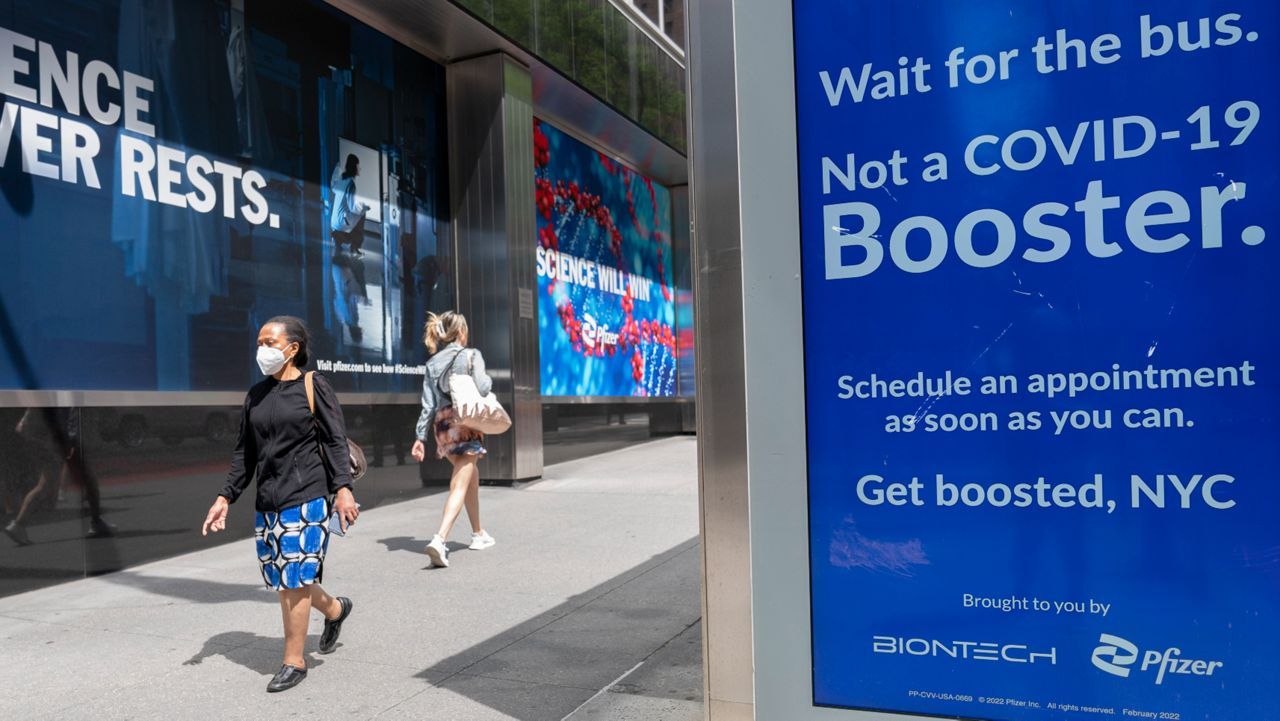New York City is entering its third pandemic winter with the least amount of public health rules in place since COVID-19 prompted a citywide shutdown in March 2020.
Mayor Eric Adams rescinded the vaccine requirements for private employers and for public school students participating in extracurricular activities. Gov. Kathy Hochul this month ended the mask requirement for public transit.
New Yorkers can largely go about their lives as though, as President Joe Biden said recently, “The pandemic is over.”
Yet public health experts, watching cases rise in Europe, are expecting New York City to experience another winter surge in infections. While they expect it to be less severe than last year’s jump in infections, they say they are worried by the city’s near total lack of rules meant to prevent virus transmission.
“The concern is that relaxing the precautions right now is going to make the city a lot more vulnerable to a surge in the coming weeks and months,” said Dr. Bruce Y. Lee, a professor at CUNY’s School of Public Health.
While hospitalizations and deaths are low, cases have risen slightly in the city in recent weeks, from a seven-day average of 1,980 new cases on Sept. 4, to 2,132 on Sept. 23, the latest day for which data is available, according to city records. The city’s coronavirus dashboard labels this growth in cases as “stable.”
The hands-off approach means that health experts aren’t sure how severe the coming wave could be.
The city has seen wide vaccination coverage for initial doses, but less so for boosters, which are key for keeping immunity to the coronavirus intact.
“I think the city needs to be doing much more in terms of putting multiple layers of protection in place,” said Dr. Stephanie Woolhandler, a professor of public health at Hunter College.
Adams faced questions Tuesday from reporters on how the city will prevent COVID-19 transmission in the temporary tent shelters that will house newly arrived migrants. Adams did not offer specifics, but said that the city’s health commissioner, Dr. Ashwin Vasan, would address the public health needs and would hold a briefing on COVID-19.
“Now that people are indoors, the weather is going to get colder, Dr. Vasan is going to be factoring in all of this,” Adams said.
Vasan has presided over the lifting of several pandemic-era health policies, including the end of the vaccine requirements to eat in restaurants and enter other venues.
He said last week that he hopes the new boosters, if adopted widely, could slow transmission of COVID-19.
“People's sense of risk is down and I think that's a good thing, and it should be reported as a good thing,” Vasan said. “People aren't as scared of COVID because fewer people are dying, fewer people are getting hospitalized, and that's a product of all of us collectively getting boosted, doing the right things, wearing masks during the worst of this.”
Yet, Lee said it’s unclear to epidemiologists and public health experts that the city’s vaccination effort to date will be effective in stopping the spread of the likely next wave.
We don’t know, he said, how much exposure during last winter’s surge came from the delta variant versus the omicron variant, the latter of which has dominated infections this year. While the omicron subvariants BA.4 and BA.5 are the most prevalent currently, new variants, such as BQ.1 and BA.2.75, are increasing their proportion of infections in Europe and the U.S., and may have a different enough structure to evade immune responses for earlier variants.
“That raises the question of how much protection can be really conferred,” Lee said, from both earlier vaccines and prior infections. “There’s a big difference between getting boosted a year ago, and getting it recently.”
Lee and Woolhandler said they encouraged New Yorkers to get a booster, and resume wearing masks in public spaces.
“I, and my entire family — we’re four doctors — we put on masks when we go in public indoor spaces,” Woolhandler said. “It would be a whole lot better if everyone did that.”
Lee stressed that masking and making other small changes, such as keeping the windows open at home or in the office, will help ensure that New York City can continue functioning with some normalcy.
“Maintaining precautions does not mean derailing your life,” Lee said.



